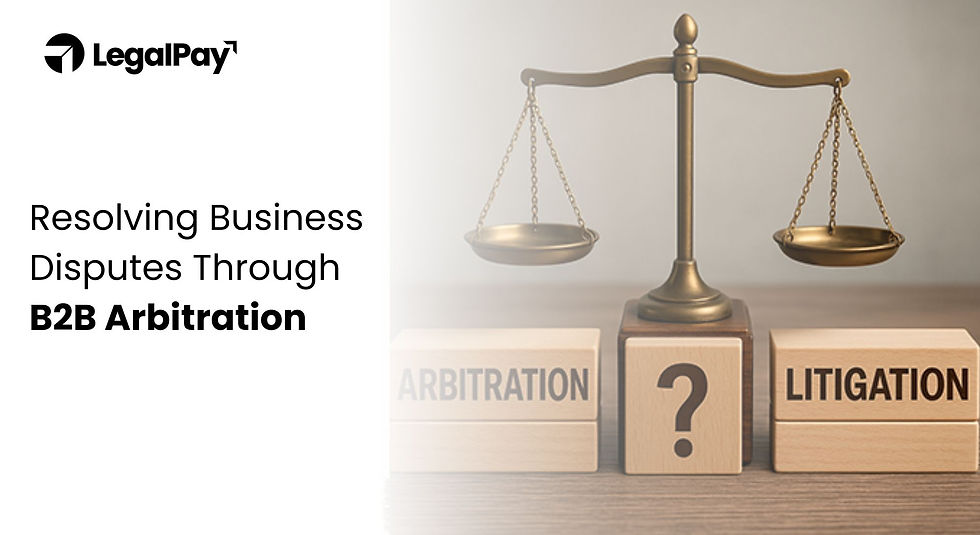Applicability of Limitation in Arbitration
- LegalPay

- Sep 27, 2021
- 3 min read

The law of limitation acts as a fulcrum for the legal machinery to run in a structured and systematic manner. This law is essentially based on the principle of 'equity helps the diligent and not the indolent', thus setting a reasonable period of recourse to be availed by the aggrieved party. This principle gains more impetus in an arbitration, which operates with the sole purpose of promoting timely dispute resolution. The Arbitration and Conciliation Act, 1996 (hereinafter 'the act') has been the subject of evolving jurisprudence with respect to its limitation at pre-application, during proceeding and post-award stages of the arbitral process.
Pre-Application: Limitation Period for Filing Application under Section 11 of the Act
Section 43 of the Act, makes it clear that the Limitation Act 1963 shall broadly apply to arbitrations the same way it does in courts, which yields, 3 years from the right to apply specified in Article 137 of the Limitation Act as the standard period of limitation. This acts as a residual provision which becomes applicable on an act which has no specific provision on limitation. In the case of Bharat Sanchar Nigam Ltd. & another vs. M/s Nortel Networks Pvt. Ltd., the apex court held that, there is a need for an amendment with respect to the limitation period followed by the parties under Section 11 of the act, as it defeats the purpose of speedy dispute resolution. The court also observed that the limitation period would start to run from the date of failure of appointment of an arbitrator after the notice for an arbitration has been issued by the court.
During the Arbitration Proceeding: Time Limit for the Arbitral Award
Section 29A administers a period of twelve months for the passing of an arbitral award in all domestic commercial arbitrations, with the option of extending the period for another six months based on the consent of both the parties in dispute, failing which the mandate of the tribunal gets terminated. In ONGC Petro Additions Limited v. Ferns Construction Co. Inc., the Delhi High Court reaffirmed the decision in Shapoorji Pallonji and Co. Pvt. Ltd v Jindal India Thermal Power Limited with respect to the retrospective applicability of the section, especially after the 2019 amendment of the act.
Post-Award: Limitation Period for Setting Aside the Arbitral Award
Section 34 of the act provides the parties with the limitation period of 3 months to apply for setting aside of the arbitral award. The general extension of 30 days has been further provided in case of delay conditional on the sufficient cause assessment of the court. In Union of India v. Tecco Trichy Engineers and Contractors,the Hon'ble Supreme Court held that the period of limitation would begin to run after the delivery and the receipt of the award under Section 31(5) of the act, calling it a matter of substance and not formality. The emphasis of receipt by the party for the delivery to be a valid one was drawn on by the court.
Effect of the Pandemic on the Limitation Period
The Hon'ble Supreme Court vide an order dated 23.03.2020, extended the period of limitation for general as well as specific laws. This relaxation was ceased with conditional buffer periods vide another order dated 08.03.2021 which earmarked that the period from 15.03.2020 to 14.03.2021 shall be excluded from counting the limitation, on the account of the decline in COVID cases in the country. The apex court was compelled to look into the matter again during the second wave, this suo motu cognizance would stand recalled from 02.10.2021 in the light of normalcy of state of affairs in the country. This inconsistency within the limitation period has assailed the basic principle of limitation: Certainty. The extension of limitation period was a necessary evil which challenged the very foundation of its being. This widening of the time limit in arbitration will be bringing on a lot of judicial burden with it by diminishing the value of meritorious claims through the incapacity of time barred feature within the limitation law.




Comments